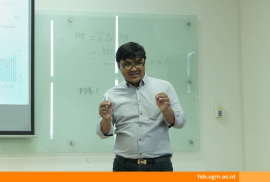The Faculty of Economics and Business, Universitas Gadjah Mada in collaboration with the Indonesian Regional Science Association (IRSA) has successfully organized the 16th Indonesian Regional Science Association International Conference. The annual conference with the theme “Institutions, Human Capital, and Development” was held virtually via Zoom on 12-13 July 2021. After holding the agenda on the second day in the form of a book launching by Prof. Iwan Jaya Azis (Cornell University) and the 2nd plenary session by Prof. Sabina Alkire (Oxford University) and Dr. Asep Suryahadi (SMERU Research Institute), the series of conference events arrived at the final session, which is the closing seminar.
The closing seminar was moderated by Prof. Budy P. Resosudarmo from the Australian National University and discussed the topic of “Building a Better Ecosystem for Research and Innovation: The Role of Scientific Communities and Associations”. As we know, science is an important aspect in accumulating knowledge in order to govern our livelihood. In order for the development of science to enhance and expand, a healthy ecosystem is needed. The presence of scientific associations allows the establishment of an ecosystem that will advance science.
Two interesting speakers were presented on that occasion, they were Prof. Jenny Corbett from the Australian National University and Prof. Arief Anshory Yusuf from Padjadjaran University. As the first speaker, Prof. Jenny Corbett discussed the key lesson from international experience of scientific association in building research and innovation ecosystems. According to her, scientific associations exist in order to facilitate the development of various disciplines. Based on the variety, she groups scientific associations into two categories, namely academic/professional associations and issue-oriented associations.
Furthermore, Prof. Corbett described the general functions of a scientific association that contribute to building a research ecosystem in a country. Internally, the many activities of the association can be divided into four important functions. The first is community building by holding conferences and offering consulting services. The second is the production and governance of science which is carried out by publishing journal publications and collecting data. Third, reproduction of the field in the sense of ensuring the sustainability of the field by encouraging the next generation of research. Fourth, build/provide academic “capital” (self-esteem indicator) by, for example, giving awards to its members.
Prof. Corbett then stated the positive impacts of scientific associations on research and innovation, including improving the quality of research and building cross-institutional community networks. In addition, the phenomenon of internationalization is also a challenge related to opportunities for local associations discussed by Prof. Corbett. However, according to her, local associations will still have their own roles domestically.
The discussion continued to the second speaker, Prof. Arief Anshory Yusuf, who focused more on the research ecosystem and the role of scientific associations in Indonesia. At the beginning of the session, Prof. Arief presented several facts, such as Indonesia being the largest paper producer in predatory journals and also the status of a World Class University, which seem distant from being carried by a university in Indonesia. These facts are issues that need to be solved together. According to him, those issues in Indonesia exist, one of which is due to structural causes such as the low budget on education and the low quality of human resources when compared to other countries. He also said that the dependence of the higher education system in Indonesia on an unconventional incentive system was also one of the causes.
So, what is the role of scientific associations like IRSA in Indonesia’s challenging environment? According to Prof. Arief, there are four most important functions that describe how associations can play a role. First, the communicative function that furthers scientific communication and plays a role in publishing journals. The second is a professional function that supports individual careers and represents collective interests. Third, the transfer function by providing a meeting place for researchers and users of research results. Fourth is the promotion function where associations can advise on policy decisions of a political institution and advocate scientific temper to society.
The IRSA Association in Indonesia has succeeded in acting as a forum that brings together 57 different institutions both from the education sector and the related government or private sector in its annual conference. The event continued with a question and answer session between seminar participants and speakers which was then followed by a closing ceremonial led by Prof. Devanto S. Pratomo as Vice Chairman of IRSA. Prof. Devanto was present to give closing remarks which officially ended the entire event, after previously there was also the announcement of BKF best paper award and LGI research award.
Reportage: Kirana Lalita Pristy/Sony Budiarso.




